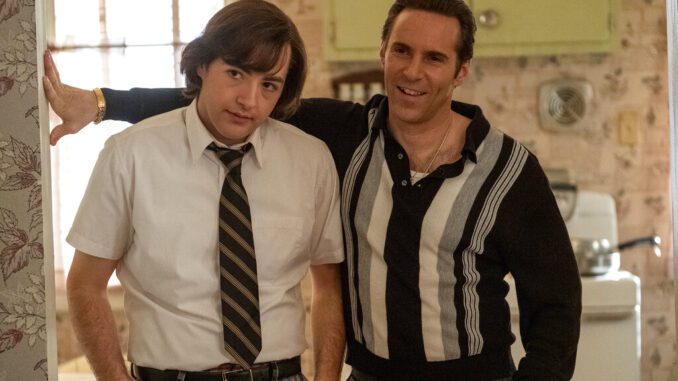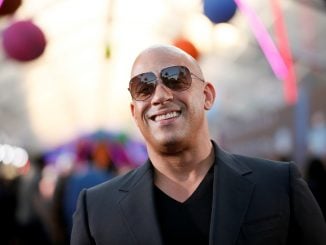
When “The Sopranos” is brought up these days, it’s usually for the nebulous way it ended: That now-famous cut-to-black in a crowded diner while Journey’s “Don’t Stop Believin'” plays. Whether Tony Soprano lived or died is still hotly debated.
The real death in 2013 of the great James Gandolfini ended hopes of putting that debate to bed, but David Chase, the creator and showrunner of “The Sopranos,” has intriguingly kept the show alive with the new prequel film “The Many Saints of Newark.”
It’s intriguing mainly because the film conjures the greatest character ever created for TV back to life but doesn’t frame him in the middle. Tony Soprano is a cameo in his own origin film.
Instead, the guy in the center is Tony’s so-called uncle, Dickie Moltisanti, played with real verve by Alessandro Nivola. Mafia boss Moltisanti is the guy young Tony looks up to. But he’s riddled with the same flaws Tony will soon share: Possessiveness, quick to anger, methodical and yet impulsive, prone to affairs and eager to consume vast amounts of pork products.
In a stroke of genius, the older of two young Tony Sopranos in the film is played by Michael Gandolfini, the son of the late actor who share his father’s wide, sad expressive eyes and bearishness. He is riveting.
All the old gang — now made young with new actors, of course — are here: Uncle June, Livia Soprano, Paulie Walnuts, Silvio Dante, Pussy Bonpensiero, Janice Soprano, Jackie Aprile, Carmela and even Christopher Moltisanti, Dickie Moltisanti’s son.
Michael Imperioli is back as the younger Moltisanti and he seems to have a bit of a chip on his shoulder about his one-time mentor, Tony Soprano, on account of the older man choking him to death in 2007. So he narrates unseen from the grave.
That leads to one of the funniest moments in the film: When an infant Moltisanti is displayed by his mother to the family but gets too close to Tony, the baby bursts into tears. “It’s like I scare him or something,” Tony shrugs.
The danger here is that the new actors have a template of what their characters will look and sound like in the future. For the most part, they avoid caricature — like Vera Farmiga nailing Tony’s fearsome mother and Corey Stoll brilliantly capturing the petty, irritable Junior. But John Magaro mugs a bit too much as Silvio, Stevie Van Zandt’s consigliere.
One problem here is time, something the film obviously plays with. “The Many Saints of Newark” arrives 14 years after “The Sopranos” ended and that may be too long for anyone but the most ardent fan to keep up. The brain strains trying to connect new faces with old ones.
The plot really is just a few slices of years in and around Newark, New Jersey, in the late 1960s and early ’70s. The DiMeo crime family — of which the Sopranos are a crew — is trying to stay afloat during civil unrest that includes deadly 1967 riots. But the film sags in many parts, never achieving the focused tautness of the series and often seems aimless. If you’re not a fan already, it might come across as “Goodfellas” lite.
A terrific Leslie Odom Jr. plays Harold McBrayer, a low-level debt collector who will soon try to run his own crew. Ray Liotta wonderfully plays not one but two characters — Dickie’s dead-eyed father and also Dickie’s philosophical, jailed uncle. If you’re a fan of “The Sopranos,” you’ll know that Dickie Moltisanti doesn’t appear in the HBO series. You’ll learn why.
But what about Tony Soprano? How does he become the anxiety-prone mobster and dad, caught in the old ways and the new, as liable to brutally garotte an informant as break down and cry while hearing The Chi-Lite’s “Oh Girl” on his car radio?
We leave him on the cusp of manhood, still teetering between criminality and innocence. Yes, he helps hijack a Mr. Softee truck, but gives away all the ice cream. Yes, he takes a pair of stolen speakers, but regrets it. “I try to be good,” he tells his uncle.
There’s a reveal of what will become his hair-trigger temper, but also a willingness to embrace mental health help, which will one day lead to a psychiatrist couch. He’s about 20 when the film ends, too soon to see what really made him.
Credit “The Many Saints of Newark” — screenplay by Chase and Lawrence Konner, and directed by series regular Alan Taylor — for attempting to tackle generational violence, structural racism and opening up a story to add more than just Italian Americans shooting each other while forking in plates of gabagool.
But it’s not enough. Tony is as mysterious at the end of “The Many Saints of Newark” as he is at the sudden end of “The Sopranos.” Perhaps that’s as it should be. Perhaps there’s room for another prequel.
“The Many Saints of Newark,” a New Line Cinema release, is rated R for strong violence, pervasive language, sexual content and some nudity. It’s in theaters and HBO Max on Friday with a running time of 120 minutes. Two and a half stars out of four.



